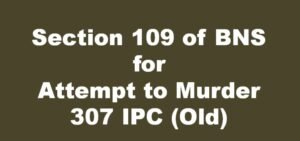Section 109 of BNS | Attempt to Murder | Section 307 IPC (Old) | Bail Provisions

Section 109 of BNS
The Section 109 of Bharatiya Nyaya Sanhita (BNS), 2023 talks about the offence “attempt to murder”.
Prior to amendment, the section 307 of Indian Penal Code (IPC) described about the “attempt to murder”
Section 109 of BNS provides punishment for attempt to murder with imprisonment which may extended to 10 years and fine.
Essential Elements of Attempt to Murder (109 BNS)
The essential ingredients of section 109 of BNS / section 307 IPC (old) are as follows:-
(i) that accused attempted to cause death of a human being;
(ii) that accused was having intention of causing death.
(iii) that accused was having intention of causing such bodily injury as:
(a) which may result into death; or
(b) the accused attempted to cause death by doing an dangerous act with probability of cause death.
(b) such bodily injury as is likely to cause death.
Punishment for Attempt to Murder (Section 109 BNS)
Section 109(1) of BNS
(a) Attempt to Murder
(b) Imprisonment for 10 years and fine.
(c) Cognizable & Non-Bailable
Section 109(2) of BNS
(a) Attempt by life-convict to murder, if hurt is caused
(b) Death, or imprisonment for life which shall mean the remainder of that person's natural life.
(c) Cognizable & Non-Bailable
Action under Self-Defence is not Attempt to Murder
The assailant party attacked on the accused and ;
The court accepted the plea of accused as true because there is no explanation from the prosecution for injuries of accused.
The medical papers of the complainant did not mention the name of the assailant though it was a medico-legal case.
The Hon'ble Supreme Court set aside the conviction of the accused for attempt to murder.
Case Reference: Rehmat v State of Haryana, AIR 1997 SC 1526
Simple Injury may not Attract Section 109 BNS
Where the accused persons had no common intention to kill or have knowledge that death was likely to ensue but only intended to vent their ire against their neighbour for having assaulted their bullocks, when the injuries sustained by the injured persons were simple in nature, the Supreme Court held the accused persons cannot be convicted under section 307 r/w 34.
Case Reference: Lakshmi Chand v State of UP, AIR 2018 SC 3961
Intention of Murder is essential to invoke Section 109 of BNS
The Supreme Court held that the the nature of injuries was not a determinative factor.
The framing of charge was challenged in this case on the ground that the injuries inflicted on the victim were simple in nature and no injury was found on any vital part of the body.
Case Reference: Ratan Singh v State of MP, (2009) 12 SCC 585
Determinative factor is intention or knowledge and not the nature of injury
The circumstances that the injury inflicted by the accused was
simple or minor will not by itself rule out application of section 307, IPC, 1860. The determinative question is the intention or knowledge, as the case may be, and not nature of the injury.
Case Reference : State of MP v Kashiram, AIR 2009 SC 1642
The Supreme Court has emphasized on “the intention or knowledge of the accused must be such as is necessary to constitute murder.
In absence of the essential ingredients of the offence, Trial Court erred convicting the accused for attempt to murder”.
The intention is to be gathered from all the circumstances, and not merely from the consequences that ensue. The nature of the weapon used, the manner in which it is used, motive for the crime, severity of the blow, and the part of the body where the injury is inflicted, are some of the factors that may be taken into consideration to determine the intention.
Case Reference : Hari Singh vs Sukhbir Singh & Ors (1988) 4 SCC 551)
Attempt to Murder (109 BNS) versus Grievous Hurst (116 BNS)
On bare perusal of these two provisions clearly reveals that while section 109 BNS uses the words "under such circumstances", these words are conspicuously missing from section 116 BNS, 2023.
Therefore, while deciding whether the case falls under section 307 IPC / 109 BNS or under section 326 IPC / 116 BNS, the Court must necessarily examine the circumstances in which the accused committed assault.
If fact reveals that the accused made some premeditation and pre-planning, acted in the dead of the night, used of the weapon can caused injuries caused.
Obviously, the case falls under the ambit of Section 109 BNS / section 307 IPC and not under section 116 BNS / 326 IPC, 1860.
Case Reference: Neelam Bahal v State of Uttarakhand, AIR 2010 SC 428
Bail Provision for Section 109 BNS
Individual has right to seek anticipatory bail or regular bail from Session Court / High Court / Supreme Court after registration of FIR.
Every case has own circumstances and merit, therefore, no one can claim anticipatory bail on the earlier decided Criminal Matter Judgments.
